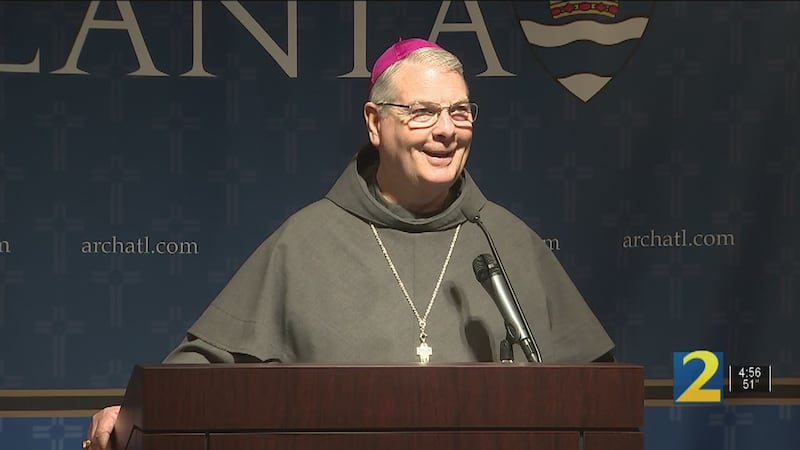ROME — Pope Francis raised 13 new cardinals Saturday, including former Atlanta archbishop Wilton Gregory.
Gregory became the first Black American to be elevated to the rank, which is the highest in the Catholic hierarchy below the Pope. Gregory is currently the archbishop of Washington, D.C. but was the archbishop in Atlanta from 2005 to 2019.
[DOWNLOAD: Free WSB-TV News app for alerts as news breaks]
Throughout the socially distanced ceremony, which clocked in at an unusually quick 45 minutes, cardinals new and old wore protective masks in a nearly empty St. Peter’s Basilica.
Most of the cardinals removed their masks when they approached a maskless Francis to receive their red hats, but Cardinal Gregory kept his on.
TRENDING STORIES:
Trump supporters file lawsuit asking Georgia to decertify election, declare Trump the winner
Atlanta toddler fighting for life after swallowing button batteries
Group of Black Atlanta entrepreneurs pays for over $40k in groceries at local Kroger
During his homily, Francis warned the new cardinals against falling into corruption or using their new rank for personal advancement, saying that just because they have a new title, “Eminence,” doesn’t mean they should drift from their people.
His comments reflected Francis’ constant complaint about the arrogance of the clerical class, as well as his current battles to fight corruption in the Vatican hierarchy.
“Let’s think of so many types of corruption in the life of the priesthood,” Francis told the new cardinals, deviating from his prepared text. If they think of themselves so grandly, “you won’t be pastors close to the people, you’ll just be ‘Eminence.’ And if you feel this way, you’ll have strayed off the road,” the pope warned.
The ceremony, known as a consistory, is the seventh of Francis’ pontificate and once again reflected the Argentine pope’s effort to name cardinals from places that have never had them before or whose service to the church he wants to highlight. Nine are under age 80 and eligible to vote in a conclave to elect a new pope, further solidifying the majority of Francis-appointed, voting-age prelates in the College of Cardinals.
Gregory told The Associated Press ahead of the ceremony that he viewed his appointment as “an affirmation of Black Catholics in the United States, the heritage of faith and fidelity that we represent.”
Gregory’s appointment comes after a year of racial protests in the U.S. sparked by the latest killing of a Black man by a white police officer. Francis has endorsed the protests and cited the American history of racial injustices.
“There is awareness now of the need for racial reconciliation, an awareness that I have not seen at this level and at this intensity before,” Gregory said.
[SIGN UP: WSB-TV Daily Headlines Newsletter]
The ceremony took place against the backdrop of the COVID-19 pandemic, which erupted in Italy in February and has seen a resurgence this fall. The Vatican is under a modified lockdown, with the Vatican Museums shuttered and Francis’ public general audiences cancelled. Instead he holds them in private, livestreamed.
The cardinal candidates and other who came to Rome from afar for Saturday’s service were required to undergo 10 days of Vatican-mandated quarantine at the pope’s hotel, where meals were brought to their rooms, Zoom calls provided contact with the outside and the cardinals’ new red robes were hand-delivered by Rome’s famed ecclesial tailors.
Usually, consistories are full of parties and crowds, with days of receptions, Masses and dinners for the new cardinals and their friends. Usually, the consistory itself is followed by “courtesy visits,” where the new cardinals greet well-wishers and the general public from the grandeur of their own reception rooms in the Apostolic Palace or Vatican auditorium. This year, there were no courtesy visits, and each cardinal was given a 10-guest limit.
With Saturday’s new cardinals, Francis has named 73 of the 128 voting-age cardinals, compared to 39 for Pope Benedict XVI and 16 for St. John Paul II. While the outcome of a future conclave can never be predicted, it’s not a stretch to suggest that a hefty majority of today’s electors presumably share the pastoral and doctrinal attitudes of the pope who named them.
The Associated Press contributed to this report.








